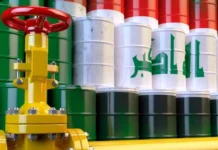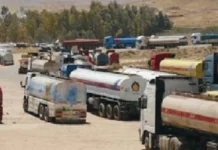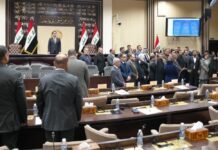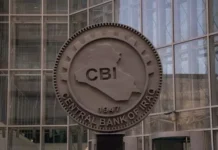Since the US invasion of Iraq, the World Bank and the US Treasury have provided necessary funds to the central bank, with estimated annual funds totaling $10 billion or more.
Iraq generates revenue from its oil sales, which is deposited into a fund at the Federal Bank. Recently, Iraq requested one billion dollars in cash from this fund. However, the bank denied the request, citing its efforts to prevent the outflow of dollars from the country.
Iraq has announced that it needs one billion dollars in cash to support its deteriorating dinar. However, the US Treasury is still studying the request. The Federal Bank is currently discussing the matter internally due to the absence of a clear and transparent financial system in Iraq. There is a lack of trust in the financial system to receive hard currency, as large amounts of dollars flow to private banks and currency exchange shops, which are subject to unclear mechanisms. There are also suspicions of corruption, money laundering, and smuggling outside of Iraq.
Iraq received a notice from the US Federal Bank refusing to send a shipment of dollars. The US aims to reduce Iraq’s use of the US dollar and encourage electronic transactions that are easier to track. US officials confirm that corruption mafias carry out smuggling operations out of Iraq. These operations negatively affect the internal price of the dollar and undermine the efforts of the Central Bank of Iraq to control its movement within the country.
The Central Bank of Iraq is taking steps to make some changes to its financial mechanisms. It has launched a rapid, phased plan to deal with dinars in the Iraqi market and gradually eliminate the use of dollars by 2024. This plan aims to control the activities of informal companies and individuals who are subject to sanctions and who buy billions of dollars through currency auctions.
The government plans to limit the use of the dollar and promote the use of the dinar as the sole currency in circulation. This will involve implementing modern technologies and developing the financial system to align with global standards, with the objective of achieving monetary stability in the country.
Although there is suspicion that the American measures may have a political aspect, it does not negate the necessity for Iraq to develop and automate its financial sector and prevent the smuggling of its oil imports outside its borders. This is in the best interest of Iraq and its people and should be prioritized before any other party in the world.
The importance of passing the HCL law has been agreed upon by all representatives, as it ensures the fair distribution of wealth to all Iraqis. This includes everyone in parliament, so it is unlikely that anyone will miss the vote. However, despite the consensus, the law has yet to be passed. We are waiting to see if there will be a new valuation based on the new international exchange rate, which could be the reason for the delay.





